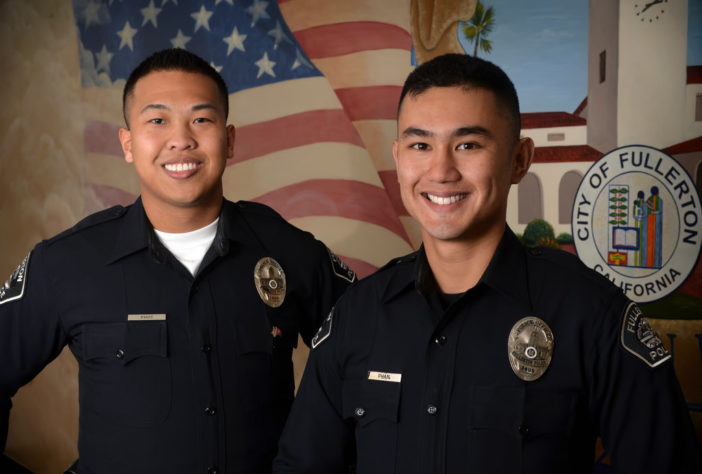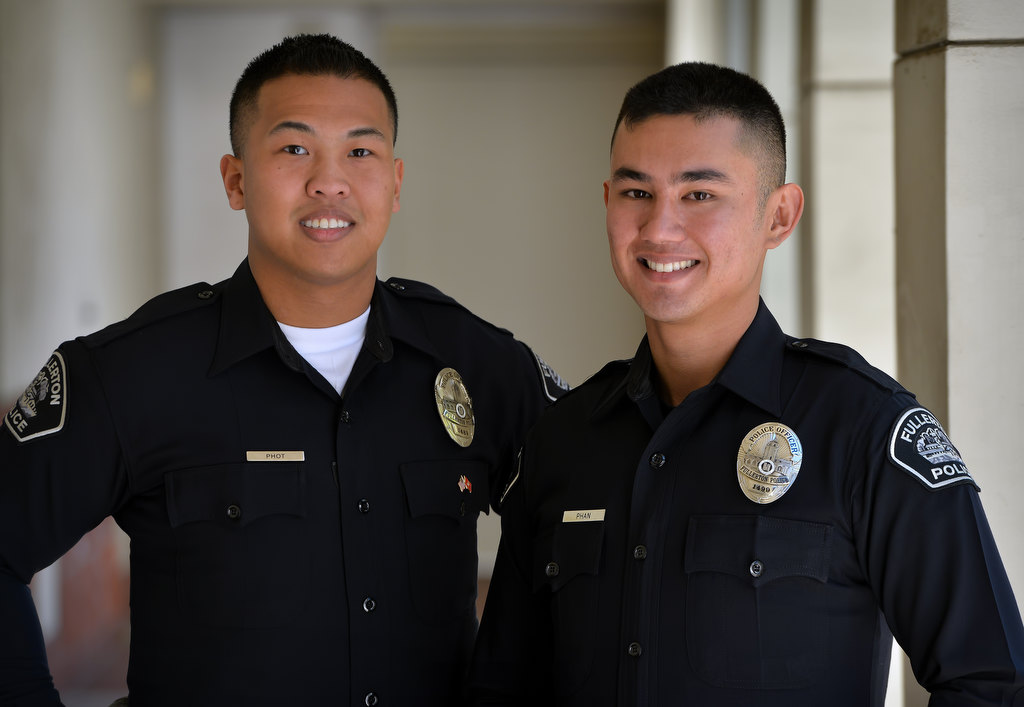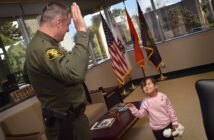When Bunnath Phot became a Marine Corps reservist in 2012, he was looking for a little direction.
“At that time,” says Phot, “I really didn’t know what to do and I thought something like that would help me be more responsible and to figure out what I wanted to do with my life.”
It did.
After some research, Phot decided that becoming a police officer was the way he wanted to go. He graduated from the police academy in March 2015 and has been a police officer with Fullerton PD since April of last year.
“It helps with everything,” says Phot of his experience in the Marine Reserves. “I [feel]like you’re more responsible… more prepared for the academy.”
The sense of purpose, public service and structure shared among military and police forces help make law enforcement a natural fit for some military reservists looking for a career.
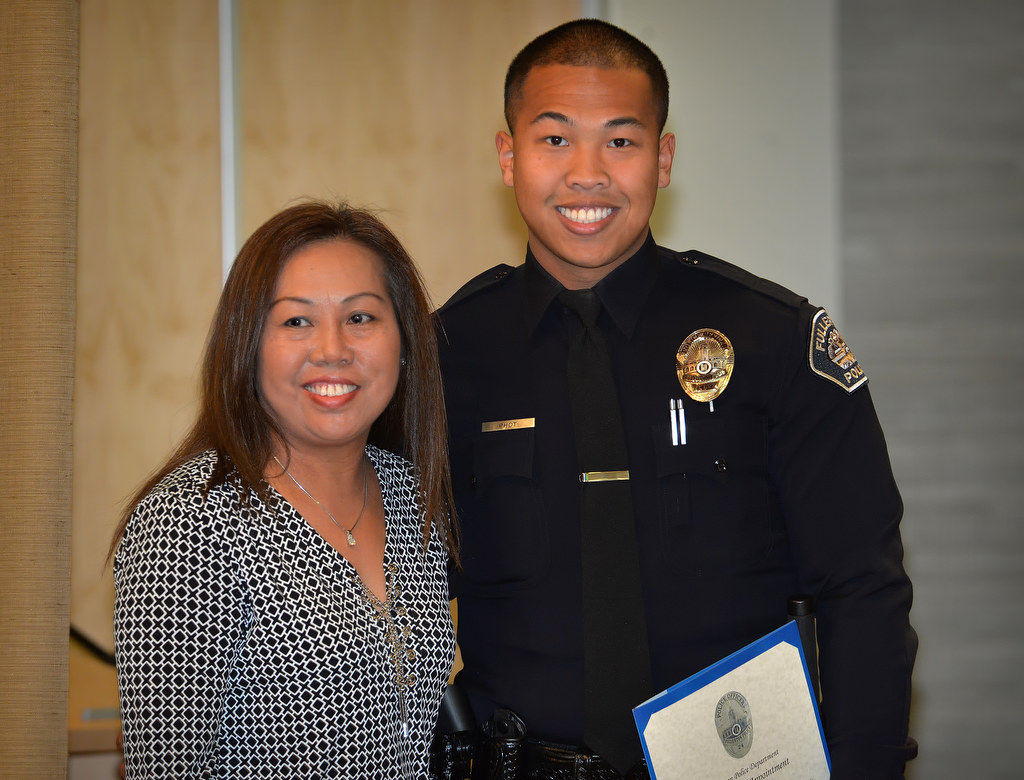
Bunnath Phot, who serves as a reservist in the U.S. Marine Corps, stands with his mother, Sovann, after receiving his police officer badge during Fullerton PD’s Promotions and Awards Ceremony in 2015.
File photo by Steven Georges/Behind the Badge OC
According to a June 2007 article in The Police Chief Magazine, citing the Department of Defense, members of the National Guard and military reserve often are police officers.
“Our military reservists demonstrate true service above self and we are thankful for their service both locally and globally,” says Sgt. Kathryn Hamel, public information officer for Fullerton PD.
In cases where reservists are called into active duty, the Fullerton PD provides a continuation of salary (the difference between regular salary and military pay) and benefits for up to 180 days – under state law, compensation is only required for the first 30 days of temporary military leave.
Phot isn’t the only military reservist at the FPD.
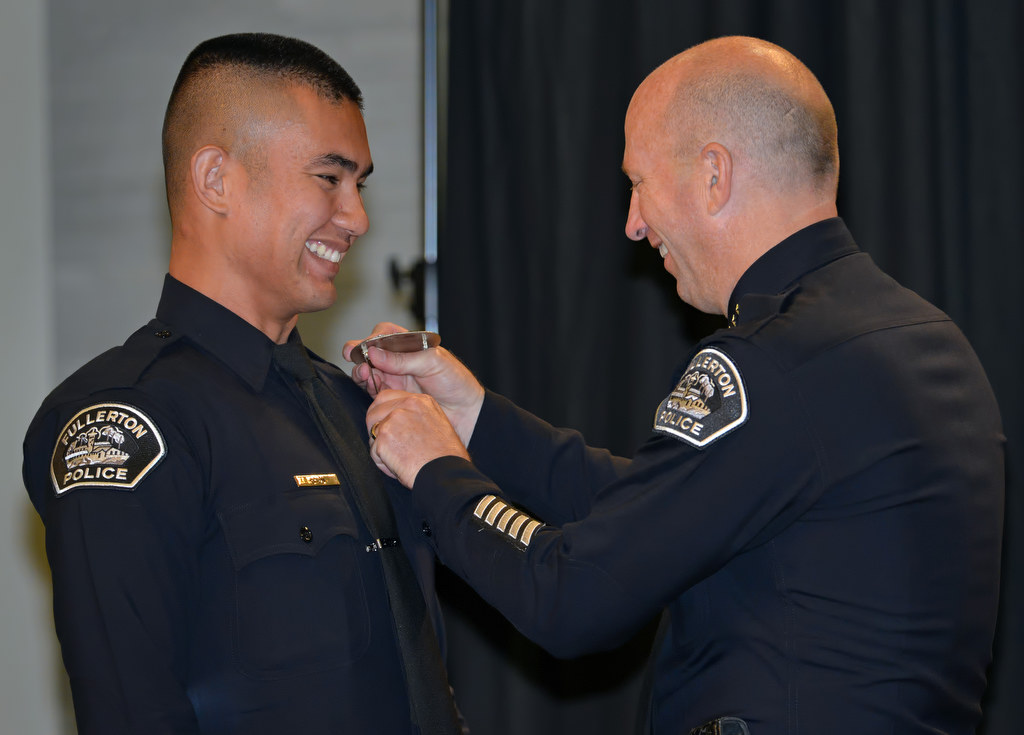
Long Phan, who served in Afghanistan with the U.S. Army, receives his police officer badge from Chief Dan Hughes during Fullerton PD’s Promotions and Awards Ceremony last year.
File photo by Steven Georges/Behind the Badge OC
Officer Long Phan is a member of the Army National Guard, a reserve unit of the U.S. Army.
Phan joined the Army as active military in 2010 and spent a year in Afghanistan. As part of his active duty contract, he was enrolled to complete an additional four years in the National Guard, which he began in 2012. In May 2015, he graduated from the Police Academy and started working at the FPD.
“When I got out of active duty military, I wanted a work structure to provide me the camaraderie that the military had. I made best friends that I will never forget in the military,” says Phan. “With law enforcement, they’re the same type of people, they’re the go-getters. … The camaraderie in law enforcement is very similar to the military.”
In addition, the ranking structure had enough similarities that the transition from military to law enforcement was made easy for Phan in terms of work environment.
Phan’s time commitment with the National Guard is one weekend a month for training or administrative tasks. Once a year, there’s a two- to three-week scenario-type training involving other companies.
“Any training that I get, whether it’s law enforcement or [military], is me gaining more knowledge,” he says. “Being able to do both law enforcement and military, it keeps me constantly learning.”
Phot has had a similar symbiotic relationship between his law enforcement and reservist work.
“I went to Marine Corps boot camp,” he says. “I guess it’s considered like the toughest one because it’s the longest one. If you’ve never experienced anything stressful or being yelled at or being told exactly what to do … it’s definitely an eye-opener.”
Because of that, he felt more prepared for the academy.
“The police academy is kind of […] the same,” he says. “They give you instructions. They yell at you. They put you in stressful situations and you have to perform.”
The only difference is you get to go home at the end of the day in the police academy; but in boot camp, you’re watched 24/7, he says.
“You learn that when they give you physical discipline, that it’s all mental,” he says. “It doesn’t matter how tired you are.”
It’s that sense of purpose that seems to drive these reservists both in their military and law enforcement lives.
“The more [I] learn, the more I feel that I’m accomplishing something,” says Phan.
At ease, officers. Mission accomplished.
 Behind the Badge
Behind the Badge
